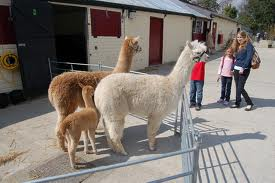 Bromley Museum
Bromley Museum Crofton Roman Villa
Crofton Roman Villa Crystal Palace Museum
Crystal Palace Museum Crystal Palace Park Farm
Crystal Palace Park Farm High Sports Crystal Palace
High Sports Crystal Palace
Crystal Palace Park Farm reopened to the public in April 2008 and now provides facilities for members of the local community who are interested in developing their skills and knowledge in animal care and welfare.
School Visits
The visits allow children to see how a city farm runs, meet the animals, learn in a fun classroom setting and see sustainability in action in an enjoyable and safe environment.
The farm offers an invaluable teaching resource. The visit can be used to teach all aspects of the curriculum through learning about animals, their care, and sustainable living in the city. We hope that this information pack will give you ideas to inspire your pupils and get the most out of your visit.
What Pupils can gain from their visit:
At all key stages a visit to the farm will include a meet and greet session, where the children can meet, look at and touch some of the animals, including the usual farm animals, such as goats, chickens, Shetland ponies and pigs, rodents, such as rabbits and guinea pigs and exotics, such as reptiles.
A visit to the farm is a great way to introduce children to new experiences, which aide in building confidence and physical skills. Our aim is to assist with the early learning goals that you have to achieve to cover aspects of the national curriculum.
A visit to the farm gives a first hand experience in a range of visual, tactile and other sensory situations. An understanding of an environment that is affected by humans is given as a good example by the farm. Important knowledge on life cycles and seasonal changes, differences between animals and humans, reproduction in animals, classification, diet and dentition amongst others, are covered.
A visit will also stimulate and excite curiosity in students as they begin to apply their knowledge and understanding of ideas.
Components covered include:
Foundation Key Stage:
■Personal, social and emotional development
■Communication, language and literacy
■Mathematical development
■Knowledge and understanding of the world
■Physical and creative development
Key Stage 1 and 2:
■Plants and animals in the local environment
■Variation
■Teeth and eating
■Moving and growing
■Habitats
■Life cycles
■Interdependence and adaptation
Examples of how a visit can enrich the curriculum:
■English – Reading and writing stories and poems about the animals on the farm
■Geography – The environment and how we can protect it
■Science – Habitat differences and care of living organisms
■Art and Design – Colouring and labeling pictures of animals and the surrounding environment and making murals
■PHSE and Citizenship – Where our food comes from and sustainable living
■Mathematics – Measuring the growth of plants and animals and collecting data
No Comments Yet - Why not be the first to leave a comment
Every effort is made to make sure that all the information is correct but we strongly recommend that you call Crystal Palace Park Farm before you set off on your day out to confirm opening times and admission prices.
Please also note that the position on Google maps for Crystal Palace Park Farm is a rough estimate using their postcode in the database and might be slightly out.
It may also be worth clicking the web link for Crystal Palace Park Farm to see if there are any special events coming up or currently on.